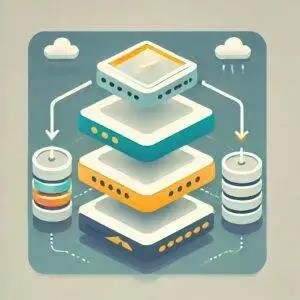Level Up Your Career: Python Django Full Stack Course
₹10,990.00
Ready to revolutionize your career in the dynamic world of web development? Our “Level Up Your Career: Python Django Full Stack Course” is your gateway to mastering the complete web development stack using Python and Django. Whether you’re a beginner or a seasoned developer, this comprehensive course is designed to propel you to new heights in your career journey.
Description
Master Full Stack Web Development with Python Django
Welcome to an exhilarating journey into the world of Full Stack Web Development with Python Django! Our immersive and hands-on course is designed to take you from a Python beginner to a proficient web developer, equipped with the skills to craft exceptional web experiences.
Course Overview: Are you ready to unlock the power of Full Stack Web Development? Look no further! Our Python Django training is a dynamic blend of Python fundamentals, object-oriented concepts, and the incredible Django framework. Get ready to dive into a captivating learning experience that will elevate your coding prowess and ignite your passion for web development.
Why This Course Stands Out:
- Comprehensive Curriculum: We leave no stone unturned! Starting from Python basics to advanced Django concepts, we’ve curated a holistic curriculum that ensures you build a strong foundation for Full Stack Web Development.
- Hands-On Projects: Theory is essential, but practice is key to mastery. Throughout the course, you’ll work on real-world projects that challenge your creativity and problem-solving skills. Build impressive web applications, and see your creations come to life!
- Expert Instructors: Our seasoned instructors are passionate about sharing their knowledge and expertise. Benefit from their years of experience in the industry as they guide you through every step of the development journey.
- Supportive Learning Environment: We believe in the power of collaboration and support. Engage with a vibrant community of fellow learners, share ideas, and learn together in a motivating and inclusive environment.
- Industry Relevance: We keep our finger on the pulse of the industry. Learn the latest trends, best practices, and valuable insights to become a sought-after web developer.
- Python basics: data types, variables, loops, and conditional statements
- Functions and modules in Python
- File handling and data input/output
- Understanding OOP principles: encapsulation, inheritance, and polymorphism
- Creating classes and objects in Python
- Working with constructors, methods, and attributes
- Exception handling: try-except blocks
- Lambda functions and list comprehensions
- Decorators and generators
- Basics of web development
- Client-server architecture
- Overview of Django and its features
- Installing Python and Django
- Working with virtual environments
- Creating a new Django project
- Understanding Django apps and models
- Creating views and templates
- Introduction to relational databases
- Working with databases in Django (SQLite, PostgreSQL)
- Creating models and migrations
- Querying data with Django ORM
- Building web forms with Django forms
- Implementing user registration and authentication
- Utilizing Django’s built-in admin interface for data management
- Building dynamic views and rendering templates
- Using template tags and filters
- Building RESTful APIs using Django REST Framework
- Integrating frontend frameworks (e.g., Bootstrap) with Django templates
- Preparing Django app for production deployment
- Deploying the app on platforms like Heroku or AWS
- Social Media Network: Build a social media platform where users can create profiles, post updates, follow other users, and engage with their posts through likes and comments.
Features:
- User Registration and Login:
- Allow users to register accounts with unique usernames and email addresses.
- Implement secure authentication for user login.
- User Profiles:
- Users can create and manage their profiles with profile pictures, bio, and other personal details.
- Posts and Updates:
- Enable users to create posts or status updates with text, images, or links.
- Support rich text editing for formatting posts.
- Follow and Unfollow Users:
- Allow users to follow or unfollow other users to see their posts in their feed.
- Feed:
- Create a personalized feed for each user displaying posts from users they follow.
- Implement pagination for efficient loading of posts in the feed.
- Comments and Likes:
- Enable users to comment on posts and like posts or comments.
- Notifications:
- Implement real-time notifications for activities like new followers, post likes, and comments.
- Search Functionality:
- Allow users to search for other users and posts based on keywords or hashtags.
Frontend:
- The frontend of the application will be developed using HTML, CSS, and JavaScript.
- Utilize front-end frameworks like Bootstrap or Semantic UI for responsive and visually appealing UI design.
- Implement AJAX or WebSocket to handle real-time updates for notifications and feed.
Backend:
- The backend will be developed using Django, Python’s web framework.
- Use Django’s built-in user authentication system for user registration and login.
- Implement views and URL routing to handle various user actions and interactions.
- Utilize Django templates for rendering dynamic content on web pages.
Database:
- Use a relational database system like PostgreSQL for data storage.
- Define Django models for user profiles, posts, comments, likes, and followers.
- Implement relationships between models for user following and post associations.
- Utilize Django’s ORM to interact with the database and perform CRUD operations.
Deployment:
- Deploy the application on a web server using platforms like Heroku or AWS.
- Use a static file server like Amazon S3 for serving media files like profile pictures and post images.
- Set up a domain and configure DNS settings for the live application.
- Integrating frontend frameworks (e.g., Bootstrap) with Django templates
- Integrating frontend frameworks (e.g., Bootstrap) with Django templates
- Integrating frontend frameworks (e.g., Bootstrap) with Django templates





Reviews
There are no reviews yet.